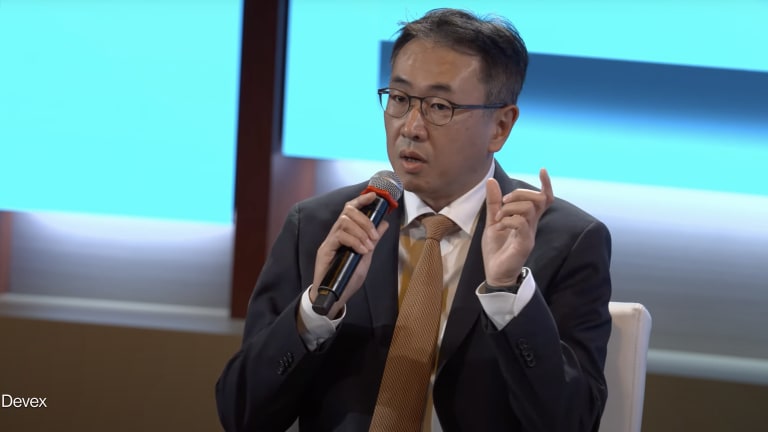
SAN FRANCISCO — Connectivity is deeply personal for Sundar Pichai, chief executive officer at Google and Alphabet.
“Growing up in India, I had to wait a lot to get connectivity,” he said at the virtual World Bank annual meetings Friday. “The first way I used a telephone was by waiting in lines in these shared spaces.”
The COVID-19 pandemic “has reinforced what access to technology means,” Pichai said in a session with World Bank President David Malpass. He noted how recent months have brought a greater sense of urgency to providing accessible, reliable, and affordable internet.
Loon, the Alphabet subsidiary using a network of stratospheric balloons to connect the unconnected in rural and remote communities, is perhaps the most high-profile work the company has done in global internet access. But Pichai did not mention the effort in his overview of initiatives to reach more than half the world’s population that still remains offline.
“Making this inclusive is one of the most important things we can do,” he said.
While the world has made big strides in access to mobile connectivity, a key next step is digital broadband penetration, Pichai said.
He mentioned Equiano, a subsea cable that will begin in Portugal and stretch to South Africa, with branching units along the way to extend connectivity to African countries.
While the project is fully funded by Google, allowing the company to expedite its timeline, Pichai said that Google plans to partner with telephone companies across the African continent.
“A lot of times, the challenges are the capex that is needed,” he said, referring to capital expenditure, as well as the difficulty of guaranteeing a return on investment in certain markets.
“Access to actual data and internet isn’t Africa’s challenge anymore. The challenge is really carrying that access from where it lands on our coasts to where there’s an ATM, a security camera, a home, a business.”
— Estelle Akofio-Sowah, West Africa regional manager, CSquaredPichai said the World Bank can play a role in drawing more private sector investment in infrastructure into low- and middle-income countries.
The institution can help to ensure there is “a pro-innovative, pro-competitive environment” in which these companies can invest, Pichai said.
Malpass noted the importance of identifying countries “where there is receptivity” to this work to build national broadband networks. Beyond infrastructure, he pointed to the need for 24/7 electricity and a supportive legal and regulatory environment. Only then can software, applications, and digital and financial services be built, which “make it all profitable or allows countries to keep building these networks,” Malpass said.
One forum for these partnerships to take shape is the Digital Development Partnership, an effort by the World Bank to engage the private sector in the digital development strategies of client countries, which Google joined in March.
But while it is one thing to identify the right approach, it is a very different thing to implement that policy, said Estelle Akofio-Sowah, West Africa regional manager at CSquared, an effort to build fiber optic networks in Africa that started as an initiative within Google in 2011.
“Most African countries have multiple fiber optic cables landing on their coasts,” she said. “So access to actual data and internet isn’t Africa’s challenge anymore. The challenge is really carrying that access from where it lands on our coasts to where there’s an ATM, a security camera, a home, a business. And beyond that, the challenge then is just in people’s ability to own a smart device and pay for connectivity.”
Akofio-Sowah emphasized the importance of education and digital skills so that young people on the continent do not just consume internet content but rather build products that meet their own needs.
Google is investing in digital skills globally. In 2017, Pichai announced that Google planned to train 10 million people in Africa in online skills over the following five years, as well as 100,000 software developers. So far, Google has trained 5 million people on the African continent, and it has programs underway in Latin America and Asia.
“Digital connectivity is just a foundation,” Pichai said. “It’s very important to take your population and make sure they are digitally skilled. And so digital skilling is an important next step.”
Another key priority for Alphabet is financial connectivity, Pichai said. He mentioned Google’s partnership with the Mojaloop Foundation, which he described as an effort to develop “open-source, real-time, interoperable payments systems.” Other backers of the initiative, which launched in May, include the Bill & Melinda Gates Foundation, Omidyar Network, and The Rockefeller Foundation.
Moving forward, he said the company seeks to partner with the World Bank and governments on digital skilling, as well as education initiatives, tools for small and medium businesses, and the innovation ecosystem.








